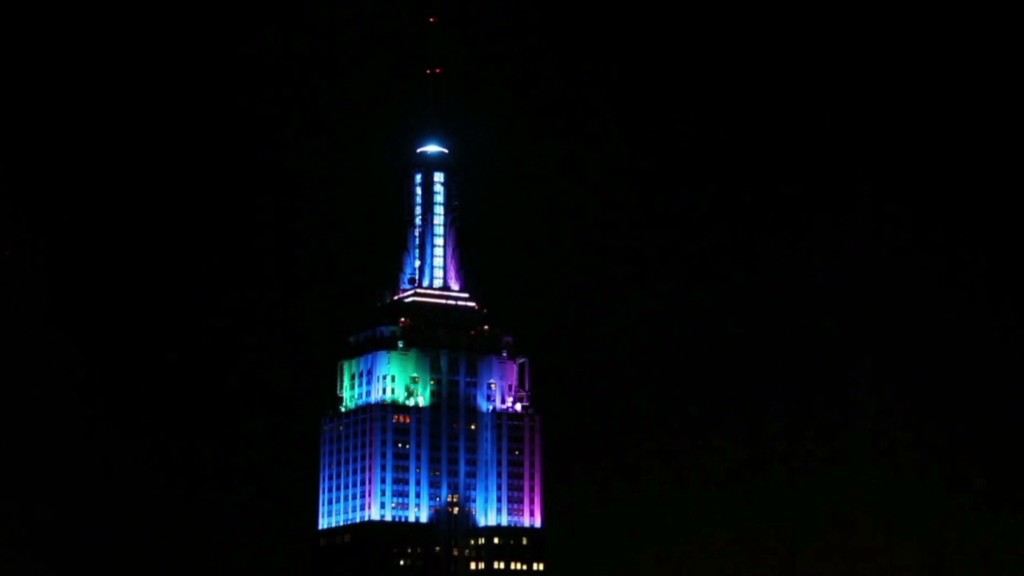
You can finally own a piece of the one of the world's most iconic skyscrapers. But you may not want to.
Empire State Realty Trust (ESRT), the parent company of New York's Empire State Building and 17 other buildings, began trading on the New York Stock Exchange Wednesday. But shares rose a modest 3% in early trading. The real estate owner's initial public offering was overshadowed by two hotter market debuts.
Empire State raised nearly $930 million in its IPO, pricing 71.5 million shares at $13 a piece. That was the low end of its offering range -- and less than the price of tickets to visit the Empire State Building's wildly popular observation deck, which range between $16 and $55 each.
Related: The IPO market is on fire
Why was the stock performance so disappointing? You would think that many investors would be clamoring for a company that owns one of the most recognizable buildings in the world. The skyscraper has been featured in many movies, most famously "King Kong."
But there has been a long battle between the Malkin family, the prominent real estate investors who control the company and pushed for the IPO, and investors with a minority stake who were against the offering.
Empire State first filed to go public in February 2012, but it wasn't until May that the Malkins won approval from 80% of shareholders to move forward.
While the Empire State Building generates the bulk of its revenue from its tenants -- including LinkedIn (LNKD) and the Federal Deposit Insurance Corporation -- its observation decks on the 86th and 102nd floors are significant money makers too, thanks to 4 million visitors a year.
Last year, Empire State building raked in $92 million in sales from its observation decks, accounting for just over 40% of total revenue.
Coats and real estate brokers do better than big buildings. Though Empire State's market debut was lackluster, that wasn't the case for Re/Max Holdings (RMAX) and Burlington Stores (BURL), which also began trading on the New York Stock Exchange Wednesday.
Shares of Re/Max jumped more than 20% from their IPO price of $22 a share, which was higher than the expected range.
Investors are continuing to bet on the housing recovery. And the Denver-based real estate franchise operator, which boasts over 92,000 real estate agents around the world, delivered an $18 million profit in 2012, up almost 30% from the previous year. One of Re/Max's top rivals, Realogy (RLGY), went public last year and has also been a hit with investors.
Related: Candy Crush game creator preps for IPO
Meanwhile, shares of Burlington Stores, known for its Burlington Coat Factory chain, jumped more than 40% on their first day of trading after also pricing above the expected range. The retailer, which sells clothing, accessories and home goods for up to 70% off department store prices, has been losing money. But sales are improving.
Burlington reported a $31 million loss for the first six months of 2013, compared to a $35 million loss for the first half of 2012. During that period, overall revenue increased almost 10%, while same store sales, a key metric for retailers gained almost 6%.
The low-cost retailer sold a little over 13 million shares in its IPO. Bain Capital, which took the company private in 2005, still owns over 50 million shares of the company.
Related: Shutdown won't delay Twitter's public IPO filing
2013 is a stellar year for IPOs. The strong debuts for Re/Max and Burlington are just the latest in what's been a great year for new stock offerings. IPO volume for the first nine months of 2013 has already topped volume for all of 2012, according to Price Waterhouse Cooper's IPO Watch report. In fact, there were 60 deals just last quarter, more than double the amount during the same period in 2012.
And thanks to a strong stock market, the new companies have been huge successes. Sprouts Farmers Market (SFM) more than doubled in its debut earlier this year. Tech firms Benefitfocus (BNFT) and Rocket Fuel (FUEL) nearly doubled when they began trading last month.
There are plenty more brand names in the pipeline, including Twitter, Chinese Internet giant Alibaba and Hilton.
IPO tracking firm Renaissance Capital warns that new stocks could face challenges from increased market volatility due to the budget battle and debt ceiling debate in Washington. But Renaissance noted that the IPO market remains on track for the most deals in 13 years.


